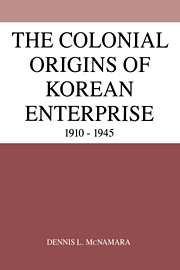6 - Pak and Commerce
Published online by Cambridge University Press: 14 October 2009
Summary
A few prominent Korean aristocrats turned to banking in the late nineteenth century. An established aristocratic and landowning family like the Kims led a few other of the landowning elite into industrial investment two decades later, again a considerable adjustment from the secure and lucrative investment in land common among the Korean aristocracy. But you find few aristocrats among leaders in commerce, for not only did the occupation of merchant rank lowest in the Confucian hierarchy of professions, but commerce itself was not sufficiently developed to attract large-scale capital in the self-sufficient, barter economy of agrarian Korean society. Both cultural and structural factors discouraged the growth of commerce critical in the transition from agrarian to commercial capital in the late Chosŏn Dynasty. The role of merchant took on a new importance with the rise of commercial agriculture stimulated by the expanding rice trade with Japan from the late nineteenth century, though still few aristocrats were numbered among the leading merchants.
A domestic market on the peninsula quickly developed for cotton, wool, and silk textiles, paper products, ceramics, and oil during the colonial period. Imports of cotton goods increased from 12 million yen to 36 million yen, woolen goods from less than 1 million to 10.5 million yen, and silk from 1 to 10 million yen between 1915 and 1935.
- Type
- Chapter
- Information
- The Colonial Origins of Korean Enterprise1910–1945, pp. 84 - 101Publisher: Cambridge University PressPrint publication year: 1990



